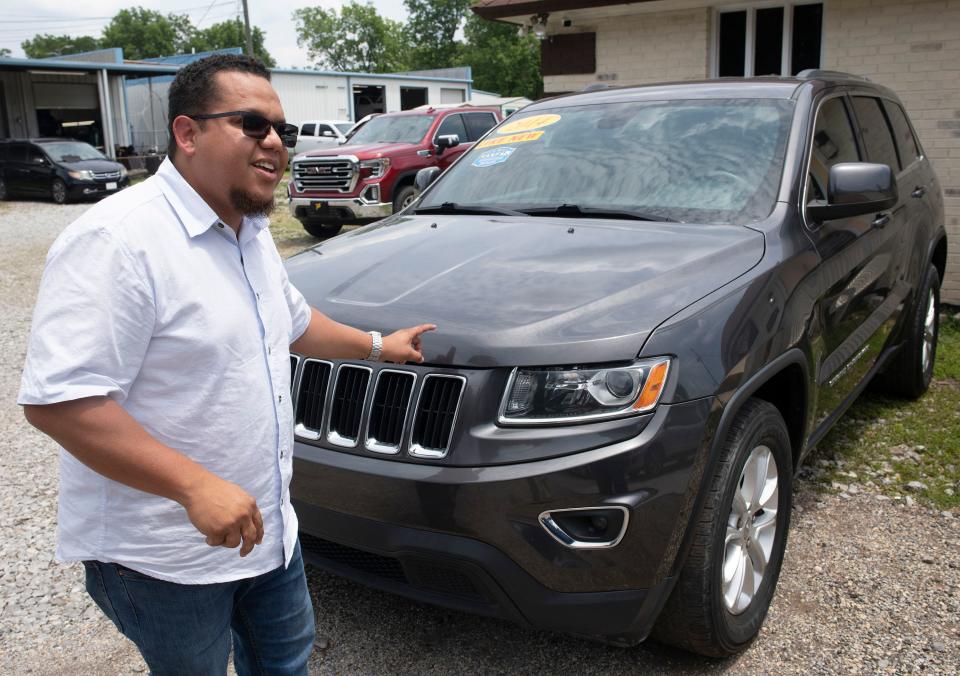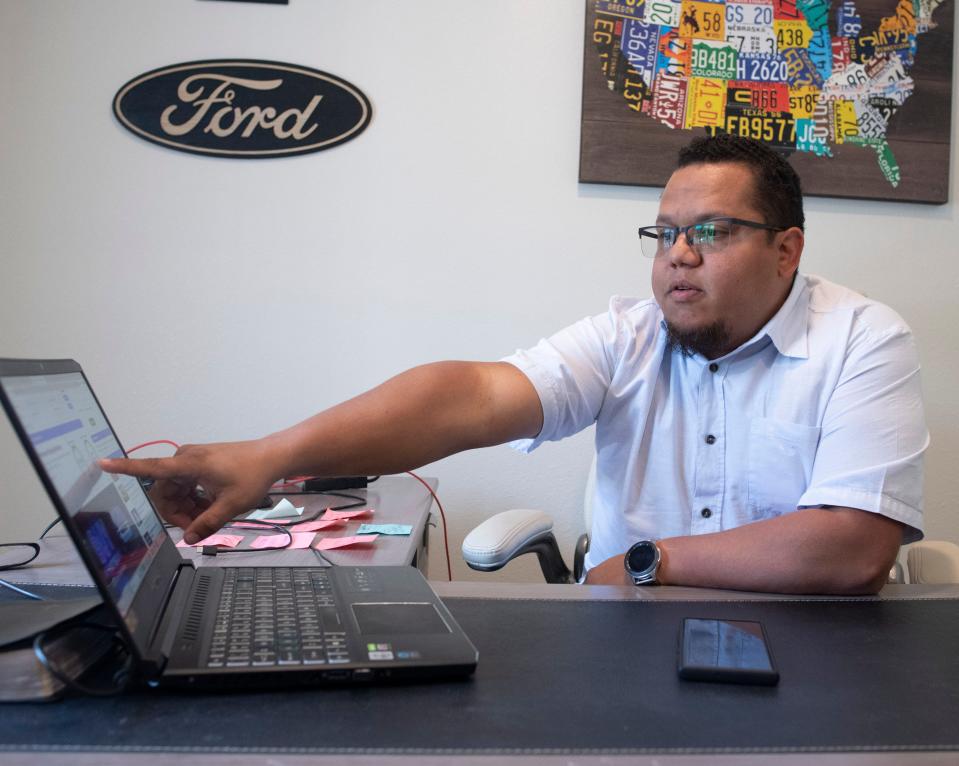What immigration bill means for Latino families. And what a Latino exodus means for Pensacola.
- Oops!Something went wrong.Please try again later.
Antonio Estaba is living out the American dream in Pensacola as a successful business owner, but he may soon have to leave Florida to keep that dream alive because of the new immigration bill signed by Gov. Ron DeSantis last month.
Estaba opened Estaba Motors, a used-car dealership that caters to the Hispanic community, in the Ensley area in 2021 after running a successful online car-selling business out of Mobile, Alabama.
Estaba fled the dictatorship in Venezuela in 2016 and came to the U.S. where he was granted asylum, helping his family start a gas station business in Alabama before his starting his own business and coming to Pensacola.
"We made a huge investment here," Estaba said.
His new Pensacola dealership was seeing success as he averaged selling 10 cars a month to local in-person customers.
When DeSantis signed SB 1718, the new immigration law, on May 10, Estaba said the local sales disappeared.
"At that moment, everything changed from one day to the other," Estaba said.
What does Florida's new immigration law SB 1718 change?
Many of the new provisions of the law go into effect on July 1.
The new law steps up requirements for employers with more than 25 employees to verify the immigration status of their employees and steps up penalties for employers who hire immigrants lacking permanent legal status.
The law makes it illegal to transport immigrants lacking permanent legal status to Florida and declares the state will no longer recognize driver's licenses from other states that are issued to people living in the country illegally. Currently, 19 states and the District of Columbia issue licenses to people living in the country illegally, according to the National Conference of State Legislatures.

Five takeaways of the new law: Florida Gov. Ron DeSantis signs sweeping immigration bill SB 1718 into law.
General strike: Florida businesses plan to strike Thursday to protest DeSantis immigration law
Other provisions of the law require hospitals accepting Medicaid funding to ask about a patient's immigration status and require hospitals to turn over the aggregate data to the state each year. However, the law doesn't require the person to answer the question to receive care.
The law also broadens the Florida Department of Law Enforcement's mission to include assisting the federal government in the enforcement of immigration laws.
Latino workers fleeing Florida may hurt Pensacola economy
Grace Resendez McCaffery, the publisher of the Pensacola-based La Costa Latina Newspaper, a Spanish-language newspaper that covers Northwest Florida and South Alabama, said there are some in Pensacola's Latino community waiting to see how the new law will affect them. Still, many others are afraid and looking for options.
"They're really upset and just really fearing the unknown, not only of what's going to change but what they're going to do," Resendez McCaffery said.
Resendez McCaffery grew up in El Paso, Texas, and has lived in Pensacola for 30 years. She founded La Costa Latina Newspaper a year after experiencing Hurricane Ivan in 2004 and saw the need in the region for a Spanish-language newspaper.
The debate and passage of SB 1718 has been like the approach of a hurricane, and Resendez McCaffery has told people to prepare for it like a natural disaster.
"Prepare their plans, their disaster plans, with not only supplies but talk to family here and anywhere else in the world, so they can let them know what they might be doing if they have to leave here," she said.
There is a fear the new law will create a hostile environment for all Latinos living in Northwest Florida regardless of immigration or citizenship status, Resendez McCaffery said.
Immigration bill clears house: Illegal immigration crackdown approved by Florida House, sent to DeSantis
"My complexion gets people to jump to conclusions or make judgments," she said. "And people treat me differently depending on the situation. So, I do know that if we continue to have this type of policy, it starts to turn people against each other. That is the fear. People will start being looked at a certain way at the grocery store. Or, especially by law enforcement, are we going to get scrutinized a little bit more? Because I'm brown, and maybe I'm suspected of having a driver's license from one of these states that this law now nullifies."
She said some people don't want to leave their homes but fear what life will be like under the new law.
"There's some that have been here for a while and, quite frankly, have come to love Pensacola, just like everybody else," Resendez McCaffery said. "They've lived peacefully, and the idea of starting all over again, I think, is terrifying for most people."
Estaba said he gets messages each day from customers who tell him they've moved out of state and can't make their next car payment because they're looking for work.
He said fear of the new law is causing many to pick up their belongings and leave, especially recently arrived immigrants who don't have much tying them to Florida.

"How they think is, they are not from here," Estaba said. "They are totally temporary here, and they are not absolutely tied to this land at all. Anything that threatens them, it's easy to leave because they have money in their pocket. They have a car. They are renting. They just put their four things in the car, and let's go."
Paola Chapman, a Pensacola realtor who markets to Hispanic clients, said she's also seen the fear here in families who have lived in Pensacola for years and started successful businesses. She said she'd been contacted by four families who want to sell their homes and leave Florida.
Chapman said many of these families are in the country legally but may have one member of the household who lacks a permanent status.
"If one is affected, the whole entire family is affected," Chapman said. "Those are people that are contributing to society, moving the economy every day, and they are leaving."
Chapman said immigrants from the Hispanic community make industries like hospitality, restaurants and construction function.
"COVID made it really bad when it comes to inventory (of new homes)," Chapman said. "We always have been dealing with a low inventory of homes for years now. So now, adding this into the mix, this is going to be horrible. People are not going to have homes."
Across the state on Thursday, the Latino community held a single-day general strike to protest the new law and show the impact their absence has on the economy.
As of Thursday morning, a running list being shared on social media showed that nearly 40 businesses in the Pensacola area were closing their doors for the day in solidarity with the strike.
Chapman said she'd been discouraged by the lack of awareness of immigrants' role in Pensacola's economy.
"It blows my mind that not many people see it happening, and they don't see the writing on the wall," Chapman said. "This is not only going to affect the immigrants. It is going to affect whoever's staying here, which is us. This is you and I."
'Knowledge is power': Families encouraged to understand impact and limits of SB 1718
Resendez McCaffery said she has been working to stop the fear of the law from causing panic and spreading misinformation.
"I think, especially in this situation, knowledge is power," Resendez McCaffery said. "It is empowering people to know their rights, to know the law as it is actually spelled out."
Resendez McCaffery said the law does not allow a landlord to evict a household just because a person in the household may lack a permanent legal status. She said she was contacted this week by a family in Okaloosa County, saying their landlord was evicting them because of the law.
"Arming people with information is what's kind of starting to help people think a little bit more," Resendez McCaffery said. "That still doesn't change some folk's minds that they just want to leave because they don't want to have to deal with it."
The provision in the law requiring hospitals to report data on patients' immigration status has led to many Hispanic communities avoiding medical care.
Chandra Smiley, CEO of Community Healthcare of Northwest Florida, said in the days after the law was signed, they started seeing a high "no-show" rate for Hispanic patients' appointments.
Smiley said patients were afraid they would have to turn over their immigration information that then would go to the state and lead to deportation.
"We have been with our frontline staff and with our phone center, and certainly with Grace's assistance have been out there making sure that they understand that not what the law says," Smiley said.
Smiley said pregnant women receiving care were asking to be induced before the law went into effect on July 1 because they feared they would be deported at the hospital and separated from their newborn baby.
Community Healthcare of Northwest Florida does not fall under the law's reporting requirement because it's not a hospital. Even at hospitals, patients can decline to answer the question about immigration status.
Further, the hospitals are only required to provide aggregate data on patients' immigration status not individual data, Smiley said.
"We're going to abide by HIPAA (patient privacy regulations)," Smiley said. "Their information is protected and held in confidence with us. And any release of that would only come at the expressed written permission of the patient."
Starting over
Estaba said his business has about six months to turn things around, or he'll have to abandon the Florida market.

After leaving Venezuela with nothing because of a dictator, he said he was not afraid to have to start over again but wished it wasn't because of another politician's personal ambitions.
He said he believes the Florida Legislature only passed the law to boost DeSantis' presidential prospects.
"I came to this country with nothing, and today with a lot of work, I have all of this," Estaba said. "And suddenly all this stuff had changed, and you have to move. I was just starting to feel comfortable here."
This article originally appeared on Pensacola News Journal: Florida SB 1718 leaves Pensacola Hispanic community bracing for impact

